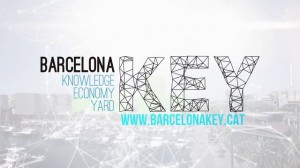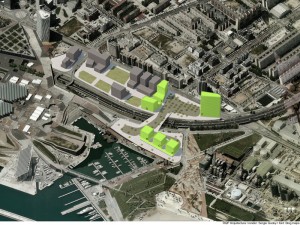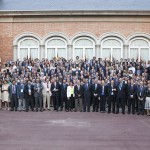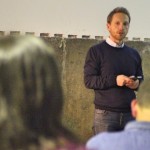Right now in Barcelona, there are several programs focused on creating the right ecosystem for business, technology, education and consequently innovation and economic growth. Just to name a few: Barcelona Growth, Barcelona Global and Barcelona KEY.
 The first one, Growth, wants to promote economic growth by making Barcelona the ideal environment for businesses. How? By strengthening the ‘Barcelona brand’ and supporting entrepreneurs. The second one, Global, involves the private community in “making it happen”. Increasing the cities competitiveness by uniting stakeholders both multinationals and research institutes as entrepreneurial advisors and individuals to create an attractive city that will attract business and talent from all over the world. Today we shine a spotlight on Barcelona KEY (Knowledge Economy Yard) after having a talk with its director Miquel Barceló.
The first one, Growth, wants to promote economic growth by making Barcelona the ideal environment for businesses. How? By strengthening the ‘Barcelona brand’ and supporting entrepreneurs. The second one, Global, involves the private community in “making it happen”. Increasing the cities competitiveness by uniting stakeholders both multinationals and research institutes as entrepreneurial advisors and individuals to create an attractive city that will attract business and talent from all over the world. Today we shine a spotlight on Barcelona KEY (Knowledge Economy Yard) after having a talk with its director Miquel Barceló.
The goal of Barcelona KEY is to attract high-value international investment projects and top-tier, global academic research activity to Barcelona to strengthen the city’s role as an economic and knowledge node. Its ambition is not only to attract international institutions to Barcelona, but also to attract international talent and provide a place where they can really obtain a global mindset. In total, Barcelona KEY expects to attract several thousand of (new) graduate students to its premises for education or work. The project is headed by the Government of Catalonia, Barcelona City Council and Sant Adrià de Besòs City Council. To set up Barcelona KEY, the administrations have reserved an urban area of 34,500 square metres of land (84,000 metres of floor space) in Sant Adrià de Besòs, in the northern part of Barcelona by the sea.
Earlier this year, the call for ideas resulted in 11 proposals. Miquel sees a big focus on engineering and technology and then mostly aimed at bio-engineering, (sustainable) energy or telecom. However, to craft the right ecosystem on the campus the engineering focus is complemented by business schools and entrepreneurial activities. “Only by combining these elements it is possible to create an interesting cluster where creativity, technology transfer and business creation can really happen.” KEY will be the campus where the cross fertilization can happen in practice.
The initial reference for KEY is the Applied Sciences NYC initiative on Roosevelt Island in New York; a joint venture between Technion-Israel Institute of Technology and Cornell University to build a culture for innovation. A nice video on this ambition can be seen here. Another inspiration is Tech City in London: a fast growing technology cluster. At Barcelona KEY they will use some methods of this innovation warehouse to give entrepreneurs access to early stage seed funds, accelerators and venture capitals. “The KEY campus must become a HUB for entrepreneurs; an urban network.” To make this possible, they want to adapt to the local ecosystem by making use of the principles of co-working.
Currently, eleven projects are selected in which twenty international institutions participate. Each project is defining its objectives, which will have to be finalized and formally presented in February 2014. Part of the Call for Project phase is to specify the development of the activity, defining the space requirements, architectural and urban aspects, and the job creation capacities of the project. The program will physically start in September 2014. Miquel sees Barcelona KEY as “an opportunity to put in value the attractiveness of Barcelona with jobs, companies and knowledge.”
The 11 proposals selected for the future Barcelona KEY are:
- European Foundation for Cluster Excellence: to provide training and education to ensure excellence in cluster management.
- RMIT (Royal Melbourne Institute of Technology) European Campus: to promote the consolidation of the RMIT European Campus, which is focused on research, doctoral and postgraduate programmes and collaborations with European industry.
- Technologies for Innovation in Products and Services in Engineering (TIPSEN) International School: to promote advances in the foundations and application of latest-generation technology to innovate in the different fields of engineering.
- GENESYS Global Enterprise Network: to commercialize students’ projects in different stages of development.
- Barcelona International Centre for Minimally Invasive Therapies (BICMIT): to develop the entire innovation value chain, from the initial stage to the last stages in which medical advances in medical practice are transferred.
- UCI-Engineering-Europe (UCIEE) Campus in Barcelona: to offer the international community access to master’s degree, doctorate or postgraduate courses and associated research activities in the fields of energy, bioengineering and telecommunications.
- Waverness: a space for neurosensory stimulation for both people with cognitive disorders and their caregivers.
- Barcelona NanoMetrology Centre (BCNanoMet): development of an R&D&I program that focuses on resolving the key challenges involved in the most important instrumentation and measurement techniques for the industry.
- European University in Catalonia: to integrate a high percentage of international students in accredited degree programs.
- New ESCP Europe Campus: creation of the new ESCP Europe campus in Barcelona.
- Digital learning for an Urban Campus: a course offer on an international scale that allows students to learn more efficiently and effectively.
Sources: Press release Barcelona KEY, interview Miquel Barceló








Leave a Reply